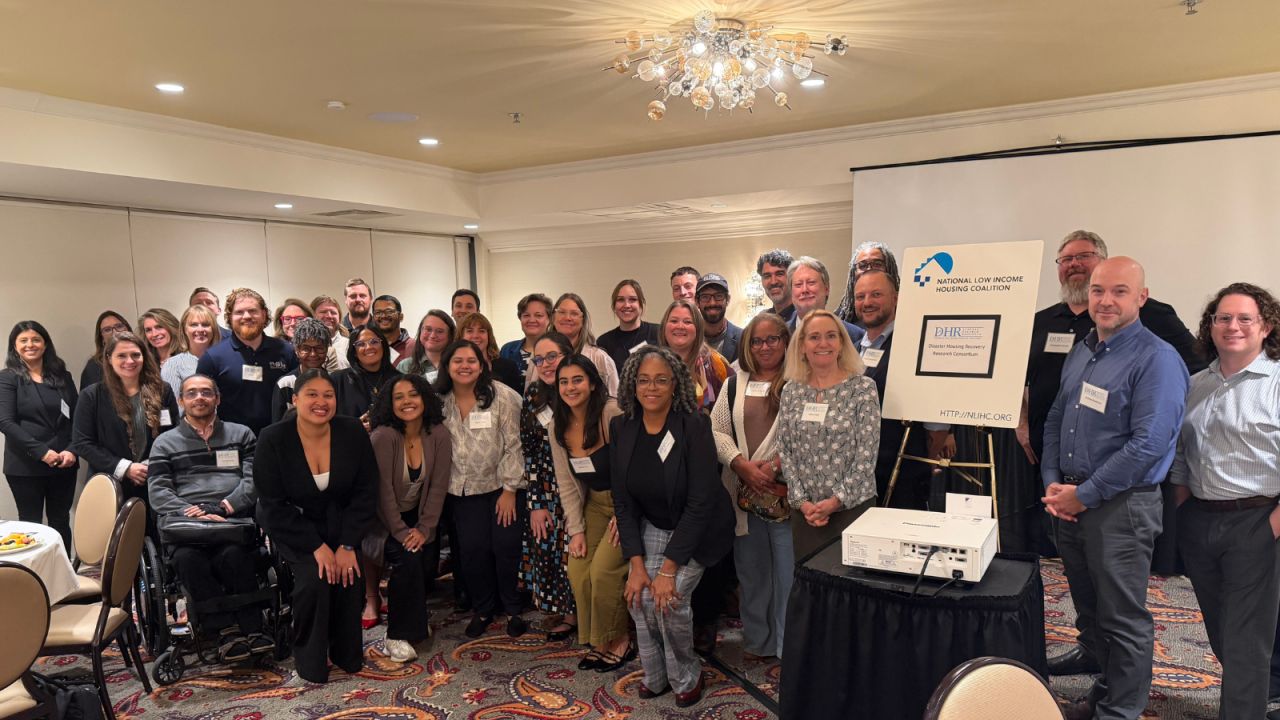Disaster Housing Research Consortium Holds Fall Meeting; Announces Selection of Collaborative Research Seed Grant Proposals
Oct 31, 2025
As part of its ongoing Disaster Housing Recovery, Research, and Resilience (DHR) initiative, NLIHC hosted an in-person convening of the Disaster Housing Recovery Research Consortium from October 21 to 23, bringing together over 40 researchers and community-based organizations. The Consortium, which convenes twice a year starting in 2024, aims to increase access to disaster assistance data, enhance understanding, and improve disaster response and recovery. It also facilitates connections between disaster-impacted communities and the research community, and shares research ideas and best practices to enhance the quality of disaster recovery-related research.

The 2025 Fall meeting of the Consortium also saw the announcement of five “Collaborative Research Seed Grants” – provided by NLIHC to Consortium members – to initiate new partnerships and collaboratively conduct research on disaster-related topics. These grants were the result of discussions held during earlier meetings, which found that funding was severely lacking for projects focused on community collaboration and non-extractive research methods. NLIHC released a Request for Proposals to Consortium members earlier this year, with the selected projects receiving $25,000 in initial funding to support them. The collaborations that were accepted largely took shape at previous Consortium meetings – an excellent example of the researcher-community collaboration fostered by the recurring meetings.
The selected projects encompass a diverse range of topics and geographic areas, spanning from Hawaii to Louisiana. They include:
- Maui Housing Hui & University at Albany, SUNY: to look at barriers to accessing assistance and achieving residential aspirations for renters impacted by the 2023 Lahaina Wildfire on the island of Maui
- Texas Housers, Harvey Forgotten Survivors Caucus, Fair Housing & Neighborhood Rights, Texas A&M, and Texas Tech: to look at repair and reconstruction quality and standards in the Houston area for Hurricane Harvey-related long-term recovery programs
- Neighborhood Partnership Housing Services, Inc. (Southern CA) and University of California, Berkeley: to look at recovery needs for Manufactured Home Communities in the aftermath of the 2025 LA Wildfires
- Louisiana Just Recovery Network and the Center for Climate Adaptation Research: to look at post-disaster reconstruction capabilities in Southern Louisiana
- Buy-In Community Planning, Climigration Network, Anthropocene Alliance, A Community Voice (New Orleans, LA), Habitat Recovery Project (Vinton, LA), Alabama Province CHDO (Prichard, AL), and Cherokee Concerned Citizens (Cherokee, MS): to look at community needs regarding voluntary buyout programs for communities with lower incomes along the Gulf Coast.
In addition to the announcement of the selected Seed Grant Proposals, the Consortium hosted group discussions around new research and challenges participants were navigating, hosted a discussion on Census-related issues led by Alison Plyer at the Data Center, heard a presentation on CDBG-DR research from Chris Emrich at the University of Central Florida and Christina Wirsching at HORNE, discussed regional variations in disaster response and recovery capabilities, and listened to policy updates from NLIHC staff and DHRC member the Protecting Immigrant Families Coalition.
On the final day of the Consortium, participants participated in a Question-and-Answer session with Republican and Democratic staff from the U.S. House Transportation and Infrastructure Committee to discuss the NLIHC-endorsed “Fixing Emergency Management for Americans (FEMA) Act,” a bipartisan bill recently passed by the Committee to restore FEMA to its status as an independent agency and institute reforms to help ensure that disaster survivors can quickly access the assistance they need to recover.